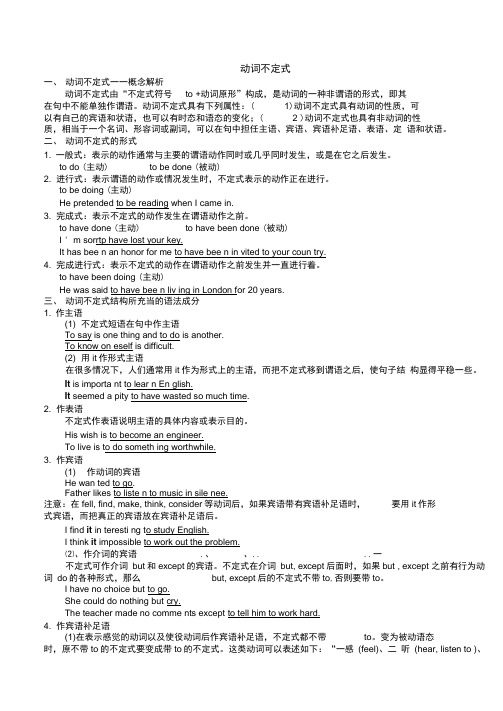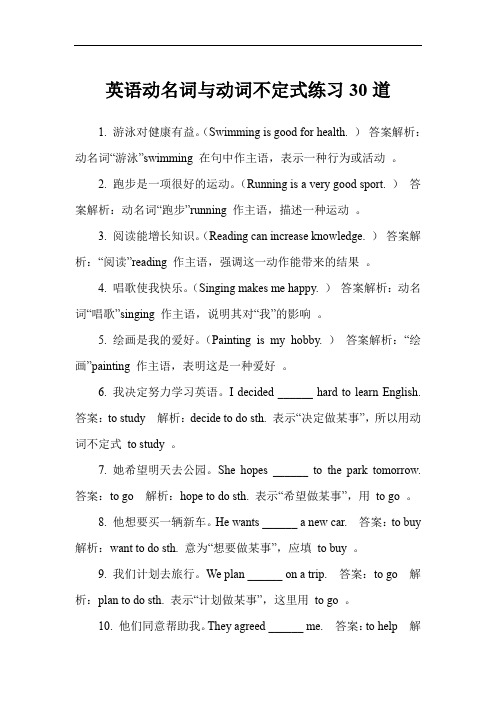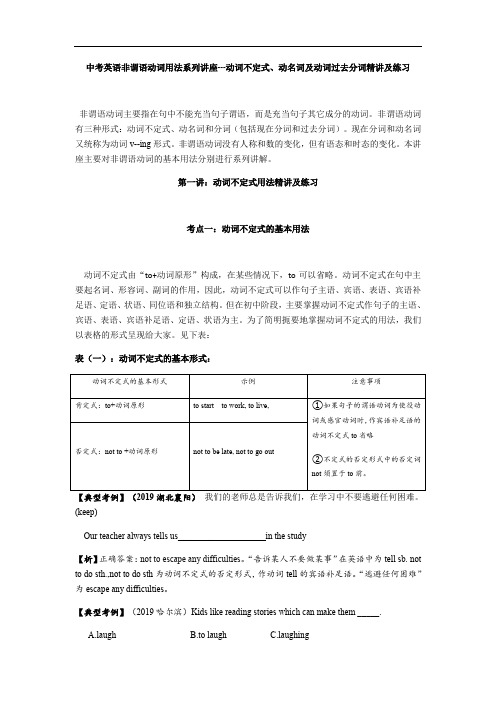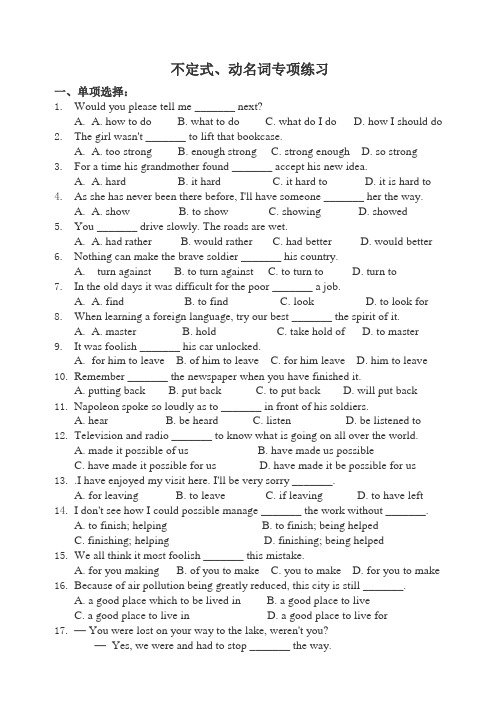动词不定式和动名词讲解及实战练习(含答案)
高一英语动词不定式讲解及练习+答案

高一英语—动词不定式考点 +练习7.1 不定式作宾语1)动词 + 不定式afford aim appear agree arrange ask be decide bother care choose come dare demand desire determine expect elect endeavor hope fail happen help hesitate learn long mean manage offer ought plan prepare pretendpromise refuse seem tend wait wish undertake举例:The driver failed to see the other car in time. 司机没能实时看见另一辆车。
I happen to know the answer to your question. 我刚巧知道你那道问题的答案。
2 )动词 +不定式;动词 +宾语 +不定式ask, beg, choose, expect , hate, help intend like, love, need prefer,prepare, promise, want, wishI like to keep everything tidy. 我喜爱每件东西都保持整齐。
I like you to keep everything tidy. 我喜爱你年使每件东西都保持整齐。
I want to speak to Tom. 我想和汤姆讲话。
I want you to speak to Tom. 我想让你和汤姆讲话。
3)动词 +疑问词 + todecide, know, consider forget, learn, remember, show, understand, see,wonder, hear, find out, explain, tellPlease show us how to do that. 请演示给我们如何去做。
不定式和动名词同步讲解和练习

动词不定式一、动词不定式一一概念解析动词不定式由“不定式符号to +动词原形”构成,是动词的一种非谓语的形式,即其在句中不能单独作谓语。
动词不定式具有下列属性:( 1)动词不定式具有动词的性质,可以有自己的宾语和状语,也可以有时态和语态的变化;( 2 )动词不定式也具有非动词的性质,相当于一个名词、形容词或副词,可以在句中担任主语、宾语、宾语补足语、表语、定语和状语。
二、动词不定式的形式1. 一般式:表示的动作通常与主要的谓语动作同时或几乎同时发生,或是在它之后发生。
to do (主动) to be done (被动)2. 进行式:表示谓语的动作或情况发生时,不定式表示的动作正在进行。
to be doing (主动)He pretended to be reading when I came in.3. 完成式:表示不定式的动作发生在谓语动作之前。
to have done (主动) to have been done (被动)I ' m sorrtp have lost your key.It has bee n an honor for me to have bee n in vited to your coun try.4. 完成进行式:表示不定式的动作在谓语动作之前发生并一直进行着。
to have been doing (主动)He was said to have bee n liv ing in London for 20 years.三、动词不定式结构所充当的语法成分1. 作主语(1) 不定式短语在句中作主语To say is one thing and to do is another.To know on eself is difficult.(2) 用it作形式主语在很多情况下,人们通常用it作为形式上的主语,而把不定式移到谓语之后,使句子结构显得平稳一些。
It is importa nt to lear n En glish.It seemed a pity to have wasted so much time.2. 作表语不定式作表语说明主语的具体内容或表示目的。
非谓语动词(动名词、动词不定式)总结及练习(附答案)

非谓语动词(动名词、动词不定式)总结及练习非谓语动词在句子中充当除了谓语....以外其它成份的动词形式,不受人称和数的限制。
在英语中,非谓语动词主要有动名词和动词不定式两种形式。
第一部分动名词1.0动名词是在动词后面+ ing (doing)的形式,把动词变成名词来使用。
比如:live → living, see → seeing, go → going,凡此种种。
2.0 动名词在句子中的成份2.1 动名词做主语e.g. Seeing is believing. seeing为动名词,在句子中做主语Learning Japanese is hard. 为动名词,在句子中做主语2.2 动名词作宾语, 此时多与一些固定的谓语动词作搭配, 见附表e.g. I like reading.He enjoyed living in France.2.3 动名词作介词的宾语,常常与类似如下短语的介词连用,如:dream of, keep awayfrom, be good at, be interested in …e.g. He is interested in drawing. 动名词drawing作in的宾语Please keep away from lying. 动名词lying作from的宾语2.4 动名词作表语e.g. Seeing is believing. 动名词believing作表语My hobby is skating. 动名词skating作表语2.5 动名词作定语, 对修饰的名词形成一种定义e.g. a dining room, a swimming pool, a waiting room…2.6 动名词作状语,逻辑主语须与主句主语报纸一致e.g. Hearing the good news, she couldn’t helping laughing. (时间状语)Having received the letter, I decided to write back. (时间状语)Having been to the Great Wall for many times, he didn’t go last week. (原因状语)Working hard, you will succeed.(条件状语)Though working hard from day to day, he didn’t get rich. (让步状语)2.7 动名词作宾语补足语,常与感官等动词连用e.g. I saw him leavingPlease keep him working.第二部分动词不定式1.0 动词不定式也是一种非谓语动词形式,其结构为“to+动词原形”,其中to不是介词而是动词不定式的符号,动词不定式没有人称和数的变化。
九年级英语动名词与不定式专项练习题及答案

九年级英语动名词与不定式专项练习题及答案动名词与不定式是英语语法中的重要部分,掌握它们对于学习英语的同学们来说至关重要。
本文将为大家提供一些有关动名词与不定式的专项练习题及答案,希望对大家的学习有所帮助。
一、动名词动名词是动词的一种特殊形式,它可以作主语、宾语或介词的宾语等。
下面是一些关于动名词用法的练习题,请根据句意选择正确的答案。
1. I enjoy _______(play/playing) basketball after school.答案:playing2. He admitted _______(steal/stealing) the money from the company.答案:stealing3. She would rather _______(stay/staying) at home than go out.答案:stay4. My parents always encourage me _______(study/studying) hard.答案:to study5. We are considering _______(go/going) to the beach this weekend.答案:going二、不定式不定式是由动词原形加上to构成,它可以作为名词、形容词或副词的补语等。
下面是一些关于不定式用法的练习题,请选择正确的答案。
1. I want _______ (to go/goes) to the concert with you.答案:to go2. She was too tired _______ (cook/to cook) dinner.答案:to cook3. The teacher asked us _______ (not talk/to not talk) in class.答案:not to talk4. He is the first person _______ (arrive/to arrive) at the meeting.答案:to arrive5. We decided _______ (leave/to leave) early tomorrow morning.答案:to leave三、动名词与不定式的比较动名词和不定式在用法上有一些区别,下面是一些关于动名词和不定式用法的练习题,请选择正确的答案。
英语动名词与动词不定式练习30道

英语动名词与动词不定式练习30道1. 游泳对健康有益。
(Swimming is good for health. )答案解析:动名词“游泳”swimming 在句中作主语,表示一种行为或活动。
2. 跑步是一项很好的运动。
(Running is a very good sport. )答案解析:动名词“跑步”running 作主语,描述一种运动。
3. 阅读能增长知识。
(Reading can increase knowledge. )答案解析:“阅读”reading 作主语,强调这一动作能带来的结果。
4. 唱歌使我快乐。
(Singing makes me happy. )答案解析:动名词“唱歌”singing 作主语,说明其对“我”的影响。
5. 绘画是我的爱好。
(Painting is my hobby. )答案解析:“绘画”painting 作主语,表明这是一种爱好。
6. 我决定努力学习英语。
I decided ______ hard to learn English. 答案:to study 解析:decide to do sth. 表示“决定做某事”,所以用动词不定式to study 。
7. 她希望明天去公园。
She hopes ______ to the park tomorrow. 答案:to go 解析:hope to do sth. 表示“希望做某事”,用to go 。
8. 他想要买一辆新车。
He wants ______ a new car. 答案:to buy 解析:want to do sth. 意为“想要做某事”,应填to buy 。
9. 我们计划去旅行。
We plan ______ on a trip. 答案:to go 解析:plan to do sth. 表示“计划做某事”,这里用to go 。
10. 他们同意帮助我。
They agreed ______ me. 答案:to help 解析:agree to do sth. 意思是“同意做某事”,所以是to help 。
【动词不定式和动名词】小初英语衔接 知识精讲+即学即练(通用版 含答案)

专题7动词不定式和动名词小初衔接精讲精练(通用版)知识精讲一、动词不定式(1)动词不定式的构成肯定:to + V 原形否定:not to + V 原形(2)常见的后面接不定式作宾语的及物动词有:want /like / love / hate / decide / hope / wish /need / agree / begin / learn / forget / help / manage / plan / prefer / pretend / try / wait / afford / start / would like + to doI want to go abroad for further study.我想出国深造。
We all agree to put off the basketball match.我同间推迟篮球比赛。
(3)某些动词在其宾语之后还可以接不定式构成宾语补足语,如:want / like / wish / ask / tell / get /teach / invite / warn / allow / encourage +sb.+to do.I wish you to enjoy a happy life .希望你生活愉快。
They invited us to attend their wedding.他们邀请我们参加他们的婚礼。
My teacher encouraged me to realize my dream.我的老师鼓励我实现我的梦想。
二、动名词(1)动名词的构成--- do+ing(2)作主语:Reading aloud is very helpful.大声朗读是非常有益处的。
Collecting stamps is interesting.集邮很有趣。
当动名词短语作主语时常用it作形式主语.It’s no use quarreling .争吵无益。
动词不定式用法全解(含测试题及答案)

动词不定式用法全解英语动词的非谓语形式为三种:动词不定式、动名词和分词。
非谓语动词没有人称和数的变化。
动词不定式是一种非谓语动词形式,其结构为“to+动词原形”,其中to不是介词,而是动词不定式的符号,称为小品词,动词不定式没有人称和数的变化。
动词不定式和其后面的名词等构成不定式短语,在句子中可以用作主语、表语、宾语、补足语、定语、状语等。
动词不定式的形式:第一部分动词不定式的时态一、动词不定式的时态:动词不定式不能在句中作谓语,尽管它本身有时态的变化,但是却不能靠自身的变化形式表示动作发生的具体时间。
动词不定式发生的时间,一般只能根据谓语动词的时间,产生相对的先后时间关系。
1.不定式的一般式,表示不定式的动作与谓语动词动作几乎同时发生,或在谓语动作之后发生,或者不强调不定式动作的时间性。
但不定式表原因时,往往先于谓语动作之前发生。
如:The news will not fail to surprise him.这个消息将不会不使他大吃一惊的。
(不定式动作在将来和谓语动作同时发生)I helped to repair the car.我帮助修理汽车。
(不定式动作在过去与谓语动作同时发生)He didn't know where to go.他不知道该去哪儿。
(不定式稍晚于谓语动作)Tell your brother not to come tomorrow.告诉你哥哥明天不要来。
(不定式晚于谓语动作)判断:He decided to sell his car.I tried to go to school in time.I hope to see you soon不定式表示谓语动作的原因时,往往发生在谓语动作之前。
如:I am very happy to see you here.She seemed surprised to meet us.(先是遇见我们,她然后很吃惊)2.不定式的完成式,通常表示动作发生在谓语动词之前。
初中英语非谓语动词1动名词动词不定式讲解_练习

非谓语动词【非谓语动词】构成:(to)+动词原形动词不定式非在句中的作用(除谓语动词外的任何成分)谓构成:V.-ing语动名词动用法(主、宾、表、定)词构成:V. -ing / V.-ed(规则变化)分词用法(表、补、定、状)(一)动名词一、动名词的构成:动名词一般由“动词原形+ing”构成二、动名词的句法功能功能例句说明主语Eating too much is bad for your health.吃得太多对你的健康有害。
谓语动词用单数形式。
宾语动词宾语介词宾语I like playing basketball very much.我非常喜欢打篮球。
Stamps are used for sending letters.邮票是被用来寄信的。
表示一般的习惯或抽象行为或经常性的动作。
表语His hobby is collecting stamps.=Collecting stamps is his hobby. 多数情况下,动名词作表语可转化成作主语。
定语She is in the reading room.她在阅览室。
We should improve our teaching methods.我们应该改进教学方法。
只表明它所修饰的词的用途、所属关系等。
置于所修饰词之前。
注意:英语中有一些词后面常跟动名词作宾语。
我们初中阶段常见的有:finish, mind, be worth, be busy, practice, have fun, have trouble/problem(in), spend...(in), feel like, be used to(习惯于), give up, keep on, consider, suggest, can't help。
我们可按下面的顺口溜记忆这些词。
完成实践值得忙(finish, practice, be worth, be busy)继续习惯别放弃(keep on, be used to, give up)考虑建议不禁想(consider, suggest, can't help, feel like)喜欢思念要介意(enjoy, miss, mind)(二)动词不定式一、动词不定时的构成不定时的基本形式为:to+动词原形,有时可以不用to,这里的to 是不定式符号,本身无词义,动词不定式的否定形式是not+(to+)动词原形。
初中英语非谓语动词讲解与练习(动名词动词不定式)(DOC)

非谓语动词构成:(to)+动词原形动词不定式非在句中的作用(除谓语动词外的任何成分)谓V.-ing语动名词动用法(主、宾、表、定)词构成:V. -ing / V.-ed(规则变化)分词用法(表、补、定、状)(一)动名词一、动名词的构成:动名词一般由“动词原形+ing”构成注意:英语中有一些词后面常跟动名词作宾语。
我们初中阶段常见的有:finish, mind, be worth, be busy, practice, have fun, have trouble/problem(in), spend...(in), feel like, be used to(习惯于), give up, keep on, consider, suggest, can't help。
我们可按下面的顺口溜记忆这些词。
完成实践值得忙(finish, practice, be worth, be busy)继续习惯别放弃(keep on, be used to, give up)考虑建议不禁想(consider, suggest, can't help, feel like)喜欢思念要介意(enjoy, miss, mind)(二)动词不定式一、动词不定时的构成不定时的基本形式为:to+动词原形,有时可以不用to,这里的to 是不定式符号,本身无词义,动词不定式的否定形式是not+(to+)动词原形。
1. 不定式作主语动词不定式作主语时,常用it作形式主语,而将真正的主语放在句末如:To learn English well is useful.→It is useful to learn English well.It’s important for us to protect the environment.注意:在kind,good,nice,clever等表示人的品质的形容词后,不用for而用of。
中考英语非谓语动词用法系列讲座---动词不定式、动名词及动词过去分词精讲及练习

中考英语非谓语动词用法系列讲座---动词不定式、动名词及动词过去分词精讲及练习非谓语动词主要指在句中不能充当句子谓语,而是充当句子其它成分的动词。
非谓语动词有三种形式:动词不定式、动名词和分词(包括现在分词和过去分词)。
现在分词和动名词又统称为动词v--ing形式。
非谓语动词没有人称和数的变化,但有语态和时态的变化。
本讲座主要对非谓语动词的基本用法分别进行系列讲解。
第一讲:动词不定式用法精讲及练习考点一:动词不定式的基本用法动词不定式由“to+动词原形”构成,在某些情况下,to可以省略。
动词不定式在句中主要起名词、形容词、副词的作用,因此,动词不定式可以作句子主语、宾语、表语、宾语补足语、定语、状语、同位语和独立结构。
但在初中阶段,主要掌握动词不定式作句子的主语、宾语、表语、宾语补足语、定语、状语为主。
为了简明扼要地掌握动词不定式的用法,我们以表格的形式呈现给大家。
见下表:表(一):动词不定式的基本形式:【典型考例】(2019湖北襄阳)我们的老师总是告诉我们,在学习中不要逃避任何困难。
(keep)Our teacher always tells us___ _ in the study【析】正确答案:not to escape any difficulties。
“告诉某人不要做某事”在英语中为tell sb. not to do sth.,not to do sth为动词不定式的否定形式,作动词tell的宾语补足语。
“逃避任何困难”为escape any difficulties。
【典型考例】(2019哈尔滨)Kids like reading stories which can make them _____.ughB.to laughughing【析】正确答案:A。
句意是:孩子们喜欢那些能让他们哈哈大笑的故事。
动词make为使役动词,其后接不定式短语作宾语补足语时,省略to。
即make sb do sth“使某人作某事”,故正确答案为A。
(完整版)高中英语语法复习讲义+训练:动词不定式(含答案),推荐文档

高中英语语法复习讲义——动词不定式一.相关知识点精讲:1.不定式作补语1)有些有动词+宾语+不定式的结构。
例如:例如;Father will not allow us to play on the street. 父亲不让我们在街上玩耍。
The officer ordered his men to fire. 长官命令士兵开火。
注意:有些动词如make,have,get,want 等可用不定式作做宾补,也可用分词作宾补。
现在分词表达主动,也表达正在进行,过去分词表达被动。
2)有些有动词+宾语+不定式的结构,不定式的动词往往是be,不定式一般可以省去。
例如:例如:We believe him to be guilty. 我们相信他是有罪的。
We know him to be a fool. 我们知道他是个笨蛋。
(to be 不能省去)典型例题Charles Babbage is generally considered the first computer.A. to inventB. inventingC. to have inventedD. having invented答案:C. 一般没有consider+宾语+be 以外不定式的结构,也没有consider+宾语+doing 的结构,排除A、B、D。
consider 用动词be 以外的不定式作宾补时,一般要求用不定式的完成式,故选C。
3)有些动词可以跟there +to be 的结构。
例如:believe expect intend like loveprefer want wish understand mean例如:We didn't expect there to be so many people there. 我们没料到会有那么多人在那里。
You wouldn’t want there to be another war. 你不至于想让另外一场战争发生吧。
初中英语动词不定式、动名词专项练习(附答案)

初中英语动词不定式、动名词专项练习(附答案)1.Would you please tell me what to do next?2.XXX.3.For a time。
it was hard for his grandmother to accept his new idea.4.As she has never been there before。
I'll have someone show her the way.5.You had better drive slowly。
The roads are wet.6.Nothing can make the brave soldier turn against his country.7.In the old days。
it was difficult for the poor to find a job.8.When learning a foreign language。
try to master the spirit of it.9.It was foolish to leave his car unlocked.改写:1.请告诉我下一步该做什么。
2.那个女孩不够强壮,无法搬动那个书柜。
3.有一段时间,他的祖母很难接受他的新想法。
4.因为她以前从未去过那里,所以我会让别人带她去。
5.你最好开车慢点,路上很湿。
6.没有什么能让勇敢的士兵背叛自己的国家。
7.在过去,穷人很难找到工作。
8.研究外语时,尽力掌握它的精神。
9.留下车子没有锁是很愚蠢的。
10.Remember to put back the newspaper when you have finished it.11.XXX as to be heard in front of his soldiers.12.n and。
have made it possible for us to know what is going on all over the world.13.I'll be very sorry to leave.14.I don't see how I could possibly manage to finish the work without being helped.15.We all think it most foolish of you to make this mistake.16.Because air n has been greatly ced。
不定式与动名词练习题及

不定式与动名词练习题及答案解析不定式和动名词是英语语法中的两个重要概念,它们在句子中可以作主语、宾语、宾语补足语等。
正确理解和运用不定式和动名词对于提高英语写作和翻译的能力非常重要。
下面是一些不定式和动名词的练习题以及答案解析,希望对你加深对这两个语法结构的理解有所帮助。
练习题一:将下列动词转换为不定式形式(动词已给出):1. do2. go3. have4. eat5. see答案解析:1. to do2. to go3. to have4. to eat5. to see练习题二:将下列句子中的动词转换为动名词形式(动词已给出):1. I enjoy swimming in the pool.2. He loves playing basketball with his friends.3. She hates cleaning the house on weekends.4. They are good at singing and dancing.5. We need more practice speaking English.答案解析:1. swimming2. playing3. cleaning4. singing, dancing5. speaking练习题三:选择正确的形式填空(不定式或动名词):1. He doesn't mind _______ (wait) for a few more minutes.2. I can't help _______ (laugh) at his jokes.3. Would you like _______ (join) us for dinner?4. She enjoys _______ (read) books in her free time.5. They decided _______ (visit) their grandparents this summer.答案解析:1. waiting2. laughing3. to join4. reading5. to visit练习题四:根据句子结构,选择正确的不定式和动名词形式:1. _______ (Swim) is her favorite sport.2. I enjoy _______ (swim) in the pool.3. She needs _______ (buy) some new clothes.4. His dream is _______ (become) a famous actor.5. I want _______ (go) to the beach this weekend.答案解析:1. Swimming2. swimming3. to buy4. to become5. to go练习题五:根据中文提示,选择正确的不定式和动名词形式:1. 我喜欢游泳。
动词不定式和动名词讲解及实战练习(含答案)

动词不定式和动名词讲解及实战练习(含答案)一、动词不定式1、动词不定式的形式动词不定式一般由“不定式符号to+动词原形”构成,有的不定式可省略to。
不定式的否定形式是“not to (do)”He asked me to play chess with him。
他让我和他一起下国际象棋。
(带1o)1 saw a boy go across the road just now。
我看见有个男孩刚才过了马路。
(不带to)The teacher told me not to be late again. 老师告诉我不要再迟到。
(否定形式动词不定式的用法2、动词不定式的用法动词不定式在句子中不能作谓语,但可以用作主语、宾语、表语,定语、状语、宾语补足语和同位语。
虽不作谓语,但它可以有自己的宾语或状语。
(1)不定式作宾语①不定式作宾语的情况比较多,经常接不定式作宾语(即动词+ to do sth。
结构)的动词有:begin(开始),care(愿意),ask(要求),hope(希望),learn(学会),expect(期望),want(想要),wish(希望),forget(忘记),like(喜欢),decide(决定),try(尝试),continue(继续),prefer(比较喜欢),pretend(假装)等。
如I hope to see the famous scientist。
( to see作hope的宾语)我希望看见那位著名的科学家。
②不定式作某些形容词的宾语。
例:ready(准备好),anxious(急于),able(能够),sure(一定),glad(高兴),sorry(难过),afraid(害怕),pleased(高兴),willing(愿意)等。
如I’m glad to meet you。
( to meet作glad的宾语)见到你很高兴。
③不定式和疑问词连用作宾语。
如:when to do(什么时候做);how to do(怎样做);what to do(做什么);why to do(为什么做);which to do(做哪一个)等。
不定式与动名词专题练习及答案

不定式与动名词专题练习及答案编辑整理:尊敬的读者朋友们:这里是精品文档编辑中心,本文档内容是由我和我的同事精心编辑整理后发布的,发布之前我们对文中内容进行仔细校对,但是难免会有疏漏的地方,但是任然希望(不定式与动名词专题练习及答案)的内容能够给您的工作和学习带来便利。
同时也真诚的希望收到您的建议和反馈,这将是我们进步的源泉,前进的动力。
本文可编辑可修改,如果觉得对您有帮助请收藏以便随时查阅,最后祝您生活愉快业绩进步,以下为不定式与动名词专题练习及答案的全部内容。
不定式与动名词专题练习1.I don't allow _____ in my drawing room. I don’t allow my family _____ at all。
A。
smoking;to smoke B。
to smoke;smokingC。
to smoke;to smoke D。
smoking;smoking选A。
allow要用动名词做宾语,用动词不定式作宾语补足语.2.Your clothes need _____。
A。
washed B. to be washedC. to wash D。
being washing选B。
need to be done相当于need doing,表示被动语态。
3.This bike is not worthy _____。
A。
to be repaired B. of repairingC。
to repair D. repairing选A.be worthy to be done的意思是"某事值得被做”。
4._____ provides us with essential nutrients, while _____ provides us with oxygen。
A。
To eat; breathing B。
Ea ting; to breatheC. Eating; breathingD. Eaten; breathed选C。
非谓语动词-不定式及动名词(答案版)

非谓语动词不定式及动名词一、不定式不定式的基本形式为:to+动词原形。
有时可以不用to,这里的to是不定式符号,本身没有词义,动同不定式的否定形式是“not(+to)+动词原形”。
动词不定式具有名词、形容词和副词的特征,因此在句中可以作主语、表语、宾语、宾语补足语、定语或状语。
词不定式的句法功能(1)不定式作主语用作主语的动词不定式通常表示一种具体的、特定的行为,其谓语动词用第三人称单数形式。
当作主语的不定式(短语)较长时,通常用it 作形式主语,而将真正的主语置于句末。
To learn English well is not easy.学好英语不容易。
To save time is to lengthen life.节约时间就等于延长了生命。
It is important for students to learn English well.学好英语对学生们来说是很重要的。
(2)不定式作宾语有些及物动词后用不定式作宾语,常见的这类及物动词有:begin,choose,continue,decide, expect,fail,forget,hate,help,hope,learn,manage,mean,need,offer,plan,prefer,pretend, promise,refuse,try,wait,want,wish,determine,dare,attempt,afford,agree,start,like。
She promised to e at nine o'clock.她答应九点来的。
l have decided to study English.我决定学英语了。
如果作宾语的不定式有宾语补足语,常用it 作形式宾语,而将真正的宾语后置。
I found it important to get up early in the morning.我发现早上早起很重要。
温馨提示巧记用不定式作宾语的动词第1页(共16页)想要,忘记,拒绝(want,forget,refuse);需要,努力,学习(need,try,learn);喜欢,同意,帮助(like,agree,help);)希望,决定,开始(hope wish,decide,begin/start(3)不定式作定语①不定式有时起形容词的作用,修饰名词、代词,在句中作定语。
初中英语动词不定式、动名词专项练习(附答案)

不定式、动名词专项练习一、单项选择:1.Would you please tell me _______ next?A.A. how to doB. what to doC. what do I doD. how I should do2.The girl wasn't _______ to lift that bookcase.A.A. too strongB. enough strongC. strong enoughD. so strong3.For a time his grandmother found _______ accept his new idea.A.A. hardB. it hardC. it hard toD. it is hard to4.As she has never been there before, I'll have someone _______ her the way.A.A. showB. to showC. showingD. showed5.You _______ drive slowly. The roads are wet.A.A. had ratherB. would ratherC. had betterD. would better6.Nothing can make the brave soldier _______ his country.A.turn againstB. to turn againstC. to turn toD. turn to7.In the old days it was difficult for the poor _______ a job.A.A. findB. to findC. lookD. to look for8.When learning a foreign language, try our best _______ the spirit of it.A.A. masterB. holdC. take hold ofD. to master9.It was foolish _______ his car unlocked.A.for him to leaveB. of him to leaveC. for him leaveD. him to leave10.Remember _______ the newspaper when you have finished it.A. putting backB. put backC. to put backD. will put back11.Napoleon spoke so loudly as to _______ in front of his soldiers.A. hearB. be heardC. listenD. be listened to12.Television and radio _______ to know what is going on all over the world.A. made it possible of usB. have made us possibleC. have made it possible for usD. have made it be possible for us13..I have enjoyed my visit here. I'll be very sorry _______.A. for leavingB. to leaveC. if leavingD. to have left14.I don't see how I could possible manage _______ the work without _______.A. to finish; helpingB. to finish; being helpedC. finishing; helpingD. finishing; being helped15.We all think it most foolish _______ this mistake.A. for you makingB. of you to makeC. you to makeD. for you to make16.Because of air pollution being greatly reduced, this city is still _______.A. a good place which to be lived inB. a good place to liveC. a good place to live inD. a good place to live for17.— You were lost on your way to the lake, weren't you?—Yes, we were and had to stop _______ the way.A. askingB. to askC. asked &n 166 bsp;D. to beasked18.She felt it a great shame _______ so severely in the presence of her boy friend.A. to criticizeB. to have criticizedC. to be criticizedD. to have been criticized19.The advertisements are trying _______ people to buy things they don't reallyneed.A. persuadeB. persuadingC. be persuadingD. to persuade20.If you were much younger, I would arrange _______ as the general manager,for all your colleagues speak highly of your work.A. for you to workB. of you to workC. for you workD. you work21.On our way back home, we _______ lunch because we felt hungry.A. stopped to haveB. stop to haveC. stopped havingD. stoped to have22.I did nothing but _______ my lessons last Sunday.A. go overB. to go overC. went overD. go on23.I'd prefer _______ home rather than _______ a walk.A. to stay; to takeB. stay; to takeC. to stay; takeD. stay; take24.He was so foolish _______ his car unlocked.A. to leaveB. that leaveC. as to leaveD. for him to leave25.Your flat needs _______. Do you want me _______ it for you?A. to clean; to doB. cleaning; doingC. cleaning; to doD. to be cleaned;doing26.What the scientist said greatly encouraged us _______ the experiment again, buthis secretary's words discouraged us _______ the experiment any more.A. to try; to doB. to try; from doingC. for trying; from doingD. trying; to do27._______ water before breakfast seemed to them a rule never _______.A. To get; breaksB. To get; to breakC. Getting; breaksD. Get; to break28.The patient was warned _______ oily food after operation.A. to eat notB. eating notC. not to eatD. not eating29.29."Do you have any clothes _______ today, Sir?" asked the maid politely.A. washB. to be washedC. to washD. to be washing30.Mr. Green has never smoked any more since his wife _______ him _______.A. suggested; to give it upB. persuaded; to give up itC. advised; to give it upD. persuaded; to give it up31.No one enjoys _______ at.A. laughingB. to laughC. being laughedD. to be laughed32.You must do something to prevent your house _______.A. to be broken inB. from being broken inC. to break inD. from breaking in33.They insisted on _______ another chance to try.A. givenB. givingC. being givenD. to be given34.--- Where is my passport? I remember _______ it here.--- You shouldn't have left it here. Remember _______ it with you all the time.A. to put;to takeB. putting;takingC. putting;to takeD. to put;taking35.His room needs _______, so he must have it _______.A. painting;paintedB. painted;paintingC. painting;paintingD. painted;painted36.After finishing his homework he went on _______ a letter to his parents.A. writeB. writingC. wroteD. to write37.The young trees we planted last week require _______ with great care.A. looking afterB. to look afterC. to be looked afterD. taken good care of38.Only _______ English doesn't mean _______ the language.A. to learn;to learnB. learning;learningC. learning about;learnD. learning about;learning39.She returned home only to find the door open and something _______.A. missedB. to be missingC. missingD. to bemissed40.She decided to devote herself _______ the problem of old age.A. to studyB. studyingC. to studyingD. study41.Remember _______ the newspaper when you have finished it.A. putting backB. put backC. to put backD. be put back42.As she is looking forward to _______ from me, please remember _______ thisletter on your way to school.A. hear;postB. hearing;to postC. be heard;postingD. be hearing;to posting43.Grandma said that she had a lot of trouble _______ your handwriting.A. to readB. to seeC. reading C. in seeing44.Writing stories and articles _______ what I enjoy most.A. isB. areC. wasD. were45.We appreciate _______ us to the ball.A. them to inviteB. to inviteC. their invitingD. beinginvited46.Would you mind _______ quiet for a moment? I'm trying _______ a form.A. keeping;filling outB. to keep;to fill outC. keeping;to fill outD. to keep;filling out47.He was afraid _______ for being late.A. of seeingB. of being seenC. to be seenD. to have seen48.I'd like to suggest _______ the meeting till next week.A. to put offB. putting offC. put offD. to be put off49..I don't see how I could possibly manage _______ the work without _______.A. finish;helpingB. to finish;being helpedC. finishing;helpingD. finishing;being helped50.Anything worth _______ is worthy of _______ well.A. doing;being doneB. doing;doingC. to be done;to be doneD. to be done;being done51.We advised them to take a re 159 st, but they insisted _______ the work.A. finishB. to finishC. in finishingD. on finishing52.I delayed _______ your letter because I had been away for a week.A. answerB. answeringC. writingD. to post53.The thief drove as fast as he could to escape _______ by the police.A. to be caughtB. be caughtC. being caughtD. catching54.I searched for my wallet and it wasn't there. At first, I thought I _______ it athome. Then I remembered _______ it out to pay for the taxi.A. must have left;to takeB. may leave;takingC. might leave;to takeD. could have left;taking55._______ the news of his father's death, he burst into tears.A. After hearingB. On hearingC. While hearingD. Having heard56._______ his mother, the baby could not help _______.A. To see;to laughB. Seeing;to laughC. Seeing;laughingD. To see;laughing57.It's no use _______ so much money on clothes.A. spendB. spentC. spendingD. being spent58.The sentence needs _______.A. improveB. a improvementC. improvingD. improved59.If he succeeded _______ a job, his children wouldn't be suffering from hungernow.A. to findB. to look forC. in findingD. in lookingfor60.I still remember _______ to my home town when I was young.A. takingB. takenC. being takenD. to take二、填入动名词的适当形式:1.Can you imagine yourself _______ in a lonely island? (stay)2.I can't understand your _______ at that poor child. (laugh)3.She didn't mind _______ overtime. (work)4.To make a living, he tried _______, _______, and various other things, but he had failed in all. (write; paint)5.We are looking forward to Mary's _______. (come)6.She was praised for _______ the life of the child. (save)7.She ought to be praised instead of _______. (criticize).8.Is there any possibility of our _______ the championship? (win)9.He came to the party without _______. (invite)四、把下列的定语从句和同位语从句改为不定式短语1.There are still a lot of difficulties we have to overcome.2.Before the machines leave the factory, there is a series of tests that must be passed.3.At the end of the speech he expressed the desire that he should come and work in China someday.4.They signed an agreement that they should expand the trade between the two countries.5.The commander gave orders that we should cross the river.五、把下列的状语从句改为不定式短语1.She was excited when she heard the news.2.I'm glad I have seen your mother.3.The mother was pleased when she saw her son doing so well at school.4. He was very happy when he saw us so happy.5. They will be disappointed when they hear it.六、把下列的结果状语从句改为enough to 或too…to 短语1.The room is so large that it can hold one hundred people.2.The room is so small that it can't hold one hundred people.3.The text is so easy that a child can understand it.4.The text is so difficult that a child can't understand it.5.He is so short that he can't be a good basketball player.动名词专项练习题参考答案一、1.B 2.C 3.C 4.A 5.C 6.A7.B8.D9.B10.C11.B12.C13.B14.B15.B16.C17.B18.C19.D20.A21.A 22.A23.C24.C25.C26.B27.B28.C29.B30.D31.C 32.B33.C34.C35.A36.D37.A38.D39.C40.C41.C 42.B43.C44.A45.C46.C47.B48.B49.B50.A51.D52.B53.C54.D55.B56.C57.C58.C59.C60.C二、1.staying ughing 3.working4.writing; paintinging6.having saved7.being criticized8.winning 9.being invited三、1.My favourite sport is swimming.2.It's no use going there today. He won't be in;(can't be in).3.Have you finished writing your composition?4.Excuse me for being;(coming);late.5.He entered the room without making any noise.6.He entered the room without being seen.四.1.There are still a lot of difficulties for us to overcome.2.Before the machines leave the factory, there is a series of tests to be passed/to pass.3.At the end of his speech he expressed the desire to come and work in China someday.4.They signed an agreement to expand the trade between the two countries.5.The commander gave us orders to cross the river.五.1.She was excited to hear the news.2.I'm glad to have seen your mother.3.The mother was pleased to see her son doing so well at school.4.He was very happy to see us so happy.5.They will be disappointed to hear it.六.1.The room is large enough to hold one hundred people.2.The room is too small (not large enough) to hold one hundred people.3.The text is easy enough for a child to understand.4.The text is too difficult (not easy enough) for a child to understand.5.He is too short (not tall enough )to be a good basketball player.。
(word完整版)高一英语动词不定式讲解及练习+答案

高一英语—动词不定式考点+练习7.1 不定式作宾语1) 动词+ 不定式afford aim appear agree arrange ask be decide bother care choose come dare demand desire determine expect elect endeavor hope fail happen help hesitate learn long mean manage offer ought plan prepare pretend promise refuse seem tend wait wish undertake举例:The driver failed to see the other car in time. 司机没能及时看见另一辆车。
I happen to know the answer to your question. 我碰巧知道你那道问题的答案。
2)动词+不定式;动词+宾语+不定式ask, beg, choose, expect , hate, help intend like, love, need prefer, prepare, promise, want, wish…I like to keep everything tidy. 我喜欢每件东西都保持整洁。
I like you to keep everything tidy. 我喜欢你年使每件东西都保持整洁。
I want to speak to Tom. 我想和汤姆谈话。
I want you to speak to Tom.我想让你和汤姆谈话。
3)动词+疑问词+ todecide, know, consider forget, learn, remember, show, understand, see, wonder, hear, find out, explain, tellPlease show us how to do that. 请演示给我们如何去做。
- 1、下载文档前请自行甄别文档内容的完整性,平台不提供额外的编辑、内容补充、找答案等附加服务。
- 2、"仅部分预览"的文档,不可在线预览部分如存在完整性等问题,可反馈申请退款(可完整预览的文档不适用该条件!)。
- 3、如文档侵犯您的权益,请联系客服反馈,我们会尽快为您处理(人工客服工作时间:9:00-18:30)。
动词不定式和动名词讲解及实战练习(含答案)一、动词不定式1、动词不定式的形式动词不定式一般由“不定式符号to+动词原形”构成,有的不定式可省略to。
不定式的否定形式是“not to (do)”He asked me to play chess with him。
他让我和他一起下国际象棋。
(带1o)1 saw a boy go across the road just now。
我看见有个男孩刚才过了马路。
(不带to)The teacher told me not to be late again. 老师告诉我不要再迟到。
(否定形式动词不定式的用法2、动词不定式的用法动词不定式在句子中不能作谓语,但可以用作主语、宾语、表语,定语、状语、宾语补足语和同位语。
虽不作谓语,但它可以有自己的宾语或状语。
(1)不定式作宾语①不定式作宾语的情况比较多,经常接不定式作宾语(即动词+ to do sth。
结构)的动词有:begin(开始),care(愿意),ask(要求),hope(希望),learn(学会),expect(期望),want(想要),wish(希望),forget(忘记),like(喜欢),decide(决定),try(尝试),continue(继续),prefer(比较喜欢),pretend(假装)等。
如I hope to see the famous scientist。
( to see作hope的宾语)我希望看见那位著名的科学家。
②不定式作某些形容词的宾语。
例:ready(准备好),anxious(急于),able(能够),sure(一定),glad(高兴),sorry(难过),afraid(害怕),pleased(高兴),willing(愿意)等。
如I’m glad to meet you。
( to meet作glad的宾语)见到你很高兴。
③不定式和疑问词连用作宾语。
如:when to do(什么时候做);how to do(怎样做);what to do(做什么);why to do(为什么做);which to do(做哪一个)等。
如I don' t know what to buy for my mother。
( what to buy作know的宾语)我不知道给妈妈买什么。
(2)不定式用作宾语补足语常用结构形式“动词+宾语+宾补”(即动词+sb+ to do sth)动词有:ask(请),force(强迫),allow(允许),expect(期望,盼望),Invite(邀请),want(要),tell(告诉),advise(建议),help(帮助),persuade(说服),permit(准许)等。
如Joan asked Mary to speak first。
(Mary在句中作宾语,to speak补充说明Mary要做的事)(3)不定式作目的状语不定式作状语,修饰动词,用于表示行为的目的,一般放在动词后面,有时放在句首。
如We ran over to welcome the new friends from the USA。
( to welcome作目的状语)(4)不定式作主语(可用it来作形式主语,将真正主语置后)To learn maths is very important。
= It is very important to learn maths。
学数学很重要。
3、省略to的不定式(1) 使役动词(make,let,have)和感官动词(see, notice, hear)后带宾语,再接不定式作宾补时,主动语态时不定式要省略to.Make sb. do sth.使某人做某事let sb. do sth。
让某人做某事have sb. do sth. 使某人做某事notice sh. do( doing)sth。
注意某人(正在)做某多see sb.do ( doing) sth。
看见某人(正在)做某事hear sb.do( doing) sth。
听见某人(正在)做某事如:1 often see him run on the road。
(省略to)我经常看见他在路上跑步。
(2) 固定搭配would rather do sth. than do sth.宁愿做某事,也不愿做某事had better (not) do sth.最好(不)要做某事二、动名词1、动名词的基本形式和性质动名词是动名词兼有动词和名词的性质。
动词的性质是可以带宾语和状语,组成动名词短语;名词的性质在句子中可以充当主语、宾语等。
“动词原形加-ing"”构成She is fond of collecting stamps。
(作宾语)她喜欢集邮。
Traveling abroad can be very exciting。
(作主语)出国旅行会是很激动人心的。
2、常见的可接动名词的动词短语有Like/dislike/enjoy/have fun +doing喜欢做mind (sb) doing介意做imagine doing 想象做suggest doing建议做practice doing练习做finish doing结束做what about/ how about doing sth 做某事如何Thank you for doing sth. 为…感谢某人at the beginning of 的起初;……的开始keep/go (on) /continue doing持续做can’t help doing情不自禁做can’t stand doing不能忍受做can’t stop doing sth 忍不住做某事feel like doing想要做go +doing (go shopping) 去做某事no +doing 禁止做某事be worth doing 值得做be busy doing sth 忙于做某事spend time/money (in) doing 花费时间做某事waste time/money (in) doing浪费时间做某事consider doing sth 考虑做某事have trouble/difficulty/problems/experience (in) doing 做某事有困难/有经验used to do 过去常常做某事be /get used for doing sth = be used to do sth.被用来作某事be /get/used to doing 习惯于做某事pay attention to doing 注意做某事hold on to doing sth 坚持做某事look forward to doing期望做某事be interested in doing=take an interest in doing对---感兴趣be good at doing sth= do well in doing sth.擅长作某事about: be worried about doing担忧做be embarrassed about doing尴尬做be annoyed about doing反感做with: be pleased with doing对做---满意prefer doing to doing宁愿—也不愿without: without doing没做from: stop sb (from) doing=prevent sb from doing=keep sb from doing(但keep sb doing使某人不停的做)by: by doing通过做三、动词不定式和动名词的关系(1)有的动词接动词+doing和接动词+to do 意义无大区别begin doing/ begin to dostart doing/ start to do开始做continue doing/to do持续做like doing / like to dolove doing / love to do 喜欢做hate doing/ hate to do讨厌做3 3. 有的动词接动词+doing和接动词+to do意义不同forget doing 忘记做过某事forget to do忘记去做某事(还未做)remember doing 记得做过某事remember to do记得要去做某事(还未做)stop doing=give up doing sth 停止做某事stop to do停下来去做另一件事try /try one’s best to do尽力做need doing需要被做(主语指物)need to do 需要做(主语指人)四、实战练习(1)从各题后的四个选项中选出可以填入句中空白处的最佳答案。
( )1. She reached the top of the hill and stopped _______ on a big rock.A. to have restedB. restingC. to restD. rest( )2. Do you know the boy _______ under the big tree?A. layB. lainC. layingD. lying( )3. You’d better ______ your bike _____ at once. It is Monday tomorrow, you know.A. to have, mendB. have, mendedC. have, to mendD. to have, mended( )4. --- Look! The lights in the classroom are still on.--- Oh, I forgot _______.A. turning them offB. turn them offC. to turn them offD. having turned them off( )5. “Can’t you read?” the officer said _______ to the notice.A. angrily pointingB. and point angrilyC. angrily pointedD. point angrily( )6. The computer center, _______ last year, is very popular among the students in this school.A. openB. openingC. having openedD. opened( )7. The policeman warned the young man _______ after drinking.A. never to driveB. to never driveC. never drivingD. never drive( )8. --- What’s the language _______ in New Zealand?--- English.A. speakingB. spokenC. be spokenD. to speak( )9. He didn’t feel like _______ out for a walk, because he had caught a cold.A. to goB. goesC. goneD. going( )10. Paul doesn’t have to be made _______. He always works hard.A. learnB. to learnC. learnedD. learning( )11. The house is not big enough for us all _______.A. to live inB. to be lived inC. to liveD. for living in( )12. A clock is made for _______ us the time.A. tellB. tellingC. to tellD. tells( )13. You’d better _______ at home all the time. It’s bad for your health.A. don’t stayB. no to stayC. not stayD. not staying( )14. The students are busy _______ ready for the exam now.A. gettingB. getC. gotD. to get( )15. The mother asked the boy _______ down the ladder, but he went on _______ instead.A. come; climbingB. to come; to climbC. to come; climbingD. coming; climbing(2)语法选择填空。
